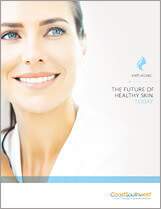Major cosmetic companies have experienced a recent downswing in sales. Some of the more disappointing figures:
- Estee Lauder reported a 6% sales decline in the Americas in their first-quarter fiscal 2020 earnings results, due to washed-out color cosmetics sales.
- L’Oreal’s like-for-like revenue dropped 1.1% in North America for the second quarter.
- Ulta reduced its revenue growth forecast to 9-12% in 2019.
This industry-wide cosmetics slump is new, but the numbers have brands and experts worried.
“After several years of very strong performance, growth in the makeup category has been decelerating over the last two years [and] recently turned negative,” Ulta CEO Mary Dillon told GCI Magazine. “Notably, when we look at sales growth by brand, we see that most of the top brands across both mass and prestige are negative year-to-date.”
There are several drivers behind this recent cosmetics sales slump: a consumer desire for a more natural, less “filtered” look, the explosion of skincare and wellness product purchasing, plus the sizable competition offered up from indie makeup brands.
However, the makeup industry can survive and thrive moving ahead. The key? More innovation and ingenuity than ever before.
Stay relevant: go natural
First and foremost, many experts believe the current craze for radiant, glowing skin is beating out the desire to “make up” a perfect complexion with cosmetic products.
“People are starting to pick up on the fact that ‘Instagram’ makeup isn’t so wearable for every day,” celebrity makeup artist Elena Miglino told FOX Business. “People are starting to prioritize skin care first and reaching for the more natural-based products.”
While the interest in achieving great skin will not slow down anytime soon, an excellent opportunity exists for formulators to create cosmetics that can deliver the “no makeup makeup” look consumers currently want. Two of the best ways to do this? With twists on traditional items (i.e. powder lipstick, instead of tubes) and by offering more products that can help rate glowing, dewy, radiant, creamy, and illuminating looks.
Join in on the wellness boom
With the current obsession for all products green and clean, many consumers are finding niche wellness products, like jade rollers, more appealing to purchase than makeup.

“There is more focus on self care, on masks, skin creams, and jade rollers rather than another layer of spackle,” said Susan Scafidi, founder and director of the Fashion Law Institute.
Rather than fight the wellness boom, formulators can join in and offer makeup products that offer feelings of ritual and and highlight the powers of popular natural ingredients.
Additionally, makeup with skincare-esque claims like brightening, tightening, and hydrating will also fare better with consumers in the future, according to GCI:
“…Particular claims within categories outperformed within their segments. For example, cheek palettes with cruelty-free and smoothing claims did well, as did those featuring kaolin clay. For lipsticks, formulations that offer long wear and paraben free claims were dominant, while coconut was the segment’s hottest ingredient. Long wear and cruelty-free also played a role in highlighters and eyeshadows, while hydrating claims were crucial in the face primer and lip balm segments…” –
Bottom line? Work with the wellness boom, not against it.
Make like the indies and go green
Finally, the makeup industry can appeal to more consumers by making like smaller, indie brands and offering cosmetics that are more eco-friendly – on all fronts. Gen Z’ers are the greenest generation yet, which means recyclable, refillable, and reusable makeup products are poised to become more popular than ever.
“With new beauty brands launching every other day, makeup needs to take cues from skincare and tick the eco-friendly boxes,” Marci,the Edited market analyst told Business Insider. “Brands that will be able to remain relevant within the shifting landscape are those that can deliver products with sustainable packaging, refillable containers with clean and cruelty-free ingredients.”
With 63% of U.S. survey respondents stating they aim to have a positive impact on the environment through everyday actions, the message to makeup formulators is clear. Go green, or expect to see a lack of consumer interest.
Innovation ahead
The cosmetics industry will remain vital and relevant to consumers with a reignited focus on offering the most up-to-date and innovative formulations, claims, and packaging. The future of the makeup might be changing, but it’s certainly looking bright.




